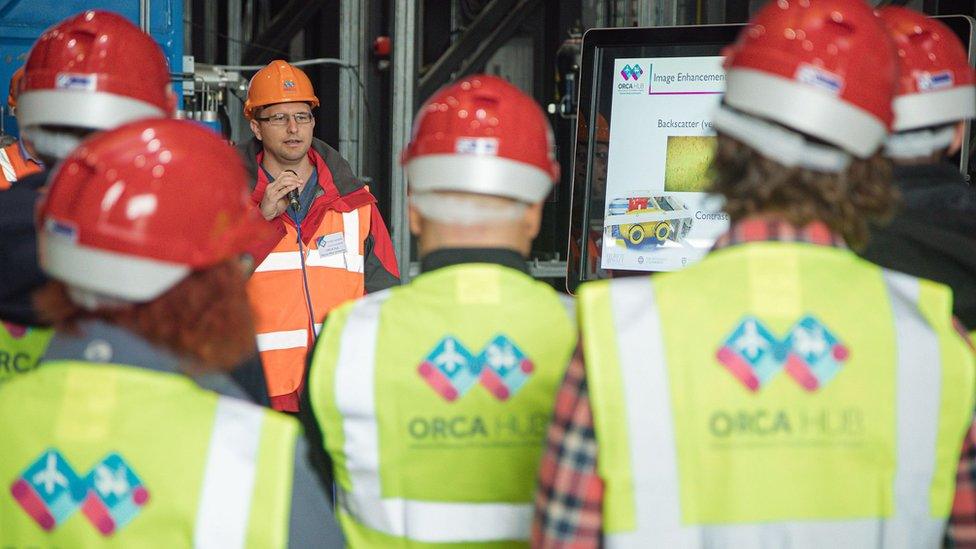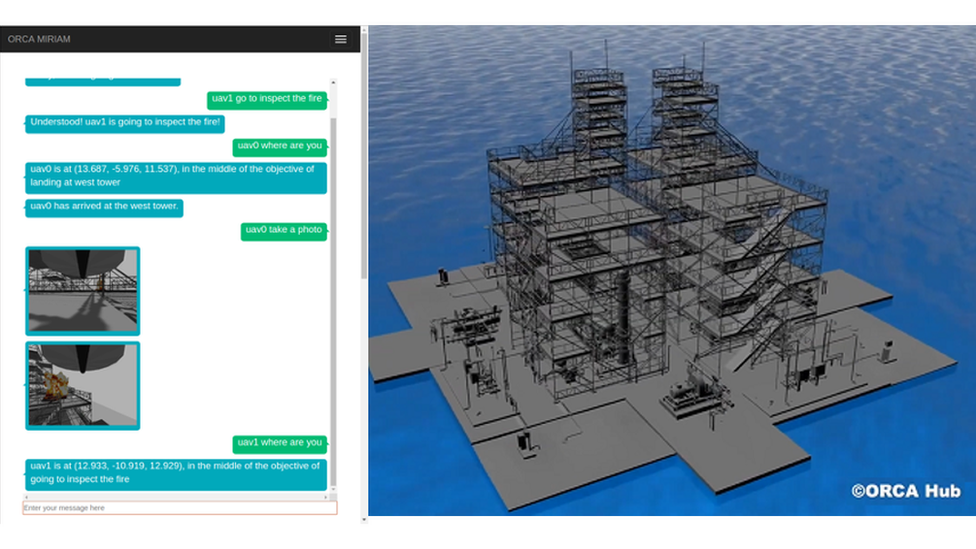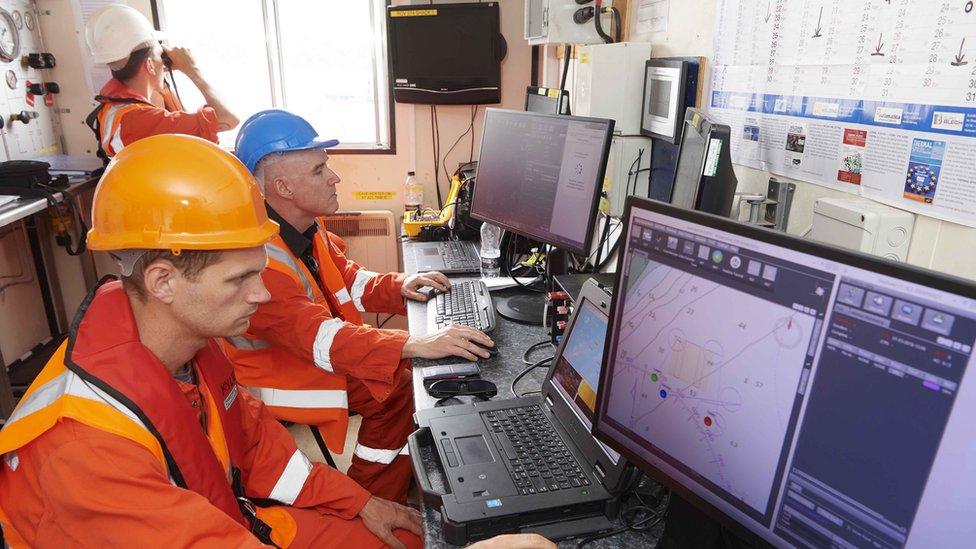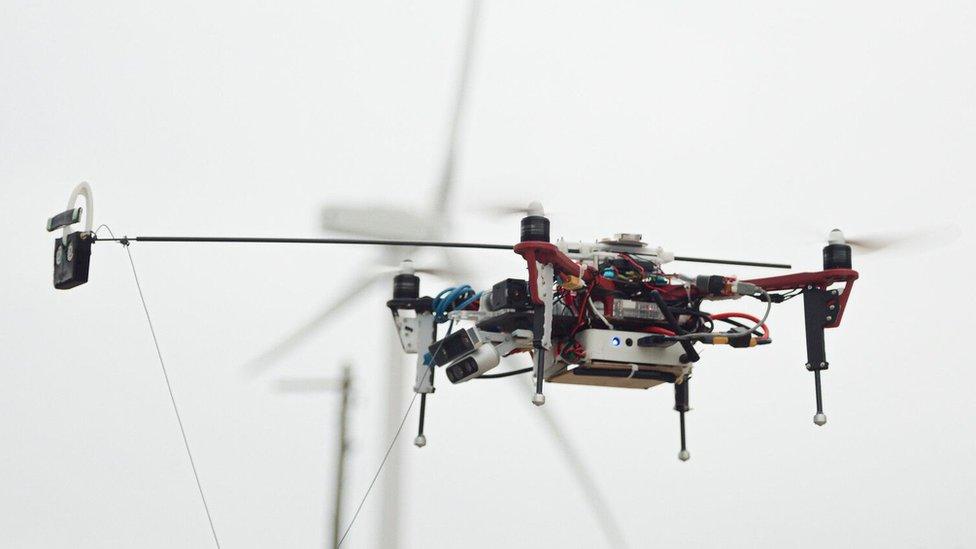Teaching offshore robots to speak our language
- Published

A new system allows users to ask robots questions and understand their actions in real time
A team of researchers led from Edinburgh have unveiled a new system that allows humans and robots to speak the same language.
The system is called MIRIAM - Multimodal Intelligent inteRactIon for Autonomous systeMs.
It allows users to ask robots questions and understand their actions in real time.
The researchers have been working from the Offshore Robotics for the Certification of Assets (ORCA) Hub, a consortium led by Heriot-Watt and Edinburgh universities.
MIRIAM uses natural language. That allows users to speak or text queries and receive clear explanations from the robot about what it is doing.
The initial applications will be in the energy industry, underwater and onshore.
"Trust me - I'm a journalist" is a line which for some reason struggles for credibility among the wider public.
Robots, it seems, have similar trust issues.
MIRAM will promote the "adoption" of robots by us warm-blooded types by improving how the robots communicate and building the confidence of the people who use them.
It is the latest aspect of a multimillion pound research investment by the energy giant Total which will see the technology used first at Total's Shetland Gas Plant.
'It's a bit like Amazon Alexa'
A tracked maintenance robot will be controlled as part of a human-robot team using MIRIAM.
Total say robots offer greater safety, efficiency and new ways of working.
Heriot-Watt University professor of computer science Helen Hastie says: "It's a bit like controlling your home with an Amazon Alexa - you use your voice: 'where are you, what are you doing?'
"The robot may be doing something strange, like avoiding an obstacle. Now it can explain why."

She says autonomous robots can sense their environment and can make some decisions by themselves.
But there is currently a communication barrier between them and their human supervisors when it comes to explaining why they take certain courses of action.
"This is particularly problematic in remote, highly challenging, and hazardous environments such as offshore, which can involve multiple vehicles and platforms."
Professor Hastie says greater trust between human and machine will mean greater safety.
"There's a need for transparency, for robots to explain how they work so you can trust them."
From that, she says, will come machines being "adopted" as the trusted partners of humans.

Prof Hastie thinks future applications will be limited only by our imaginations
"A lot of the work we've done on robots has been to make them able to plan and take their own decisions. But if we can't get them adopted that'll all go to waste."
MIRIAM will be used by a new collaborative team in which Heriot-Watt will integrate its research with the engineering software firm Phusion and the data science company Merkle Aquila.
Funding and support has come from the UK's Engineering and Physical Sciences Research Council, Dstl and SeeByte Ltd.
The ORCA Hub is led by the Edinburgh Centre for Robotics, a partnership between Heriot-Watt University and the University of Edinburgh. The consortium also includes Imperial College London, Oxford and Liverpool universities.
MIRIAM's first task in the field will be to build a human team with a tracked robot called OGRIP.
That stands for Offshore Ground Robotics Industrial Pilot, a machine developed by Total, the Austrian tech firm Taurob and the Aberdeen-based Oil and Gas Technology Centre.
OGRIP has been designed to support energy exploration and production operations in increasingly harsh and challenging conditions. These include extreme cold, arid climates and isolated locations.
MIRIAM has also been used with Husky, a chunky wheeled robot which exists in the relative calm of Heriot-Watt's robotics lab.
'Change in attitude'
Prof Hastie thinks future applications will be limited only by our imaginations, sharpened by the current global crisis.
"Since Covid-19 struck there's been a shift in attitude towards robots," she says.
"It's a devastating situation but an opportunity for robots to do real good.
"Ours are big, ugly robots - a bit different from the healthcare robots you see with friendly faces.
"But they get the job done."
- Published14 October 2019

- Published8 November 2017
